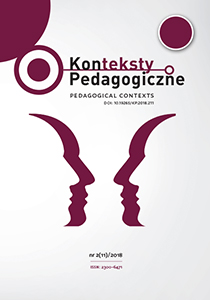Wspieranie rozwoju myślenia komputacyjnego uczniów w klasach I-III za pomocą nowych technologii w ramach warsztatów multimedialnych z tabletami EMPIRIA
Supporting the development of computational thinking in children attending grades I–III of elementary school with the use of new technologies as part of multimedia workshops with the EMPIRIA tablets
Author(s): Gabriela Budziszewska, Ewa MusiałSubject(s): Social Sciences, Education, School education
Published by: Wydawnictwo LIBRON
Keywords: computational thinking; IT education; multimedia workshops; pupil; student; Empiria
Summary/Abstract: Nowadays, expected citizens’ competencies in the field of digital technology go far beyond the traditionally understood computer literacy and proficiency in using technology. Of course, these skills are still needed, but they are not sufficient in the times when computer science is becoming a common language of almost every field of life and equips them with new tools. The basic task of the school – literacy in the field of reading, writing and calculating – requires to be expanded by the literacy in the field of computer programming skills, which is essentially a systematic problem solving consisting of four stages: decomposition, i.e. dividing a given problem into components; identification of occurring in it regularities, i.e. analysis, abstracting, i.e.; eliminating irrelevant elements and creating an algorithm, i.e. solving a given problem step-by-step problem. In computational thinking, the role of the computer is emphasized (then it is a kind of data arranging and formulating problems and solutions in such a way that they are understandable also for computers and adds stages related to translating a solution into a language intelligible for a computer – programming, including coding, and also finding other applications of a given algorithm solutions adapting to other contexts (http://www.ceo.org.pl/sites/default/files/newsfiles/elementy_myslenia_komputacyjny_wedlug_ceo.pdf ). Empiria organizes specialized workshops with the use of modern technologies whose aim is to integrate and expand the content of the core curriculum in the field of education, primarily IT education, according to the assumption that in the future children will become creators of digital culture, instead of being only its passive recipients. Practical training, which is carried out through tablets accessible to each participant, is the most important part of the classes. The values that Empiria follows are: modern education (using mobile technologies), empirical cognition (continuous and practical activity), mobility (availability of company services throughout Poland), joy, inspiration, freedom.
Journal: Konteksty Pedagogiczne
- Issue Year: 11/2018
- Issue No: 2
- Page Range: 39-53
- Page Count: 15
- Language: English

